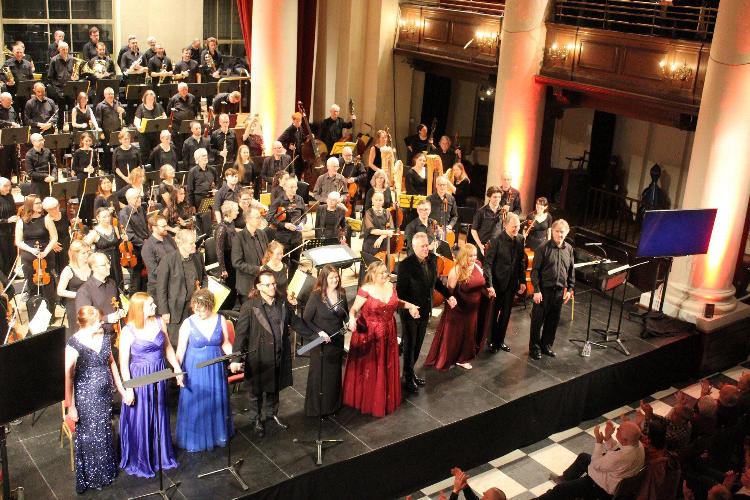Of note in the capital over the past few years have been the full-length Wagner concerts from the London Opera Company. Derived from a need to keep making music in lockdown, they have since then not shied away from taking on the blockbuster Wagner operas, epic in length and taxing on both artists and audiences.
In Götterdämmerung (Twilight of the Gods), we are faced with the phenomenal finale to Wagner’s Ring Cycle. After four days of music, the fantastical sphere melds Norse, German, and Icelandic myths to masterful operatic effect. Conductor Peter Selwyn was up to the challenge and was bold and brave, bringing out the vital components of the score, filled with leitmotifs and hefty themes galore. The brass had slight slips, but we can let this slide.
Under no circumstances should doing any big Wagner work be underestimated. Götterdämmerung might be the summit of this point, and all involved braced themselves and were rewarded with finely sung outings. I won’t be able to list all in the cast, but I had little to moan about when it came to casting or delivery.
Cara McHardy as Brünnhilde was impressive, in one of opera’s most demanding roles. The joy of romance, the plunge into heartbreak, betrayal, vengeance, then spiritual redemption is such a rollercoaster, with the finale being the remarkable standout. Everything comes together in the last twenty minutes when McHardy had the vocal score almost entirely to herself for the literal end of the world. If I told you the story of Götterdämmerung and the full cycle, this would be at least 1,000 words long.
Neal Cooper as Siegfried had the youthful cockiness and idle nature the role requires. Vocally, seemingly young and sharp, the heat of the hall amounted to some coughs before his big-hearted death scene.
Hagen, sung by Simon Wilding, we were told, was recovering from a cough. He still delivered stellar vocals for most of the over four hours. His acting was the strongest from the cast, treating Siegfried and Gutrune’s wedding as a toxic, laddish affair. Always a delicious villain, hyper-fixated on acquiring the ring and engaged in a never-ending feat of scheming, Wilding fared very well in the role.
Familiar face Paul Putnins as Gunther played him as the usual less confident, idle half-brother of Hagen. Hearing him here, this might be the best he’s done, and he is so well suited to Gunther it worked a charm. His vicious fight with Hagen after Siegfried is killed was the most dramatic spark between the cast. Philippa Boyle as Gutrune is always impressive vocally; the role itself is a foil to Hagen, as she is often twisted and tricked. Harriet Williams, as the other Valkyrie Waltraute, has the beefy monologue telling her sister Brünnhilde what their father Wotan has been up to since he banished the latter.
Freddie Tong also felt like a standout as Alberich, Hagen’s father, in a dreamy sequence opening Act Two. Physical in performance and singing with the eerie, slimy quality the character should have, this was top-notch. The Norns and three Rheinmaidens were also highly evocative in their brief appearances. The Norns’ telling of the full back catalogue, then the eventual end of all things, and the Rheinmaidens lamenting their loss of gold and asking Siegfried to return the ring made from it, frame the opera in their urgency and mysticism. Some of my favourite scenes are with both these trios.
The Vassals and a small ladies’ chorus also shone, the only time we had a proper chorus in the entirety of the Ring. Taken from the Gentlemen of the Longborough Community Chorus, it was rather harmonically fetching, their bullish joining in with Hagen’s fraternal flights.
On the scale this was on, it was very impressive, and I’d love to hear more. Almost overwhelming. Parsifal sounds very exciting for next year.
The London Opera Company will perform Wagner’s Parsifal in concert at Smith Square Hall in 2026.
Review: James Ellis Photo: London Opera Company

